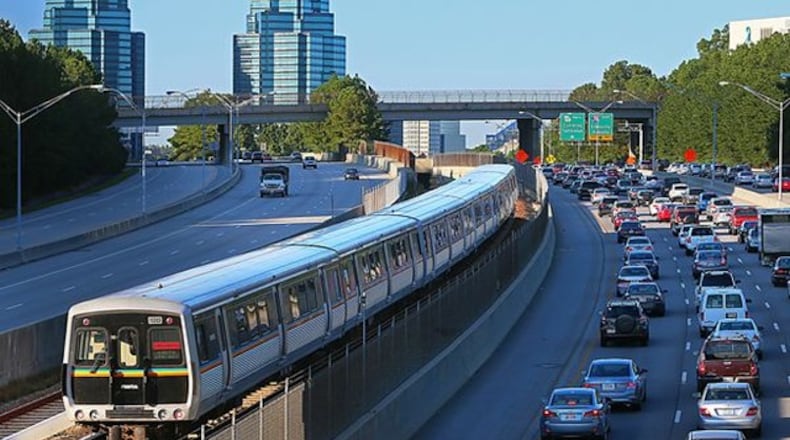As Gwinnett County voters consider a one percent sales tax to increase to fund county transit service, there are some major positive and negatives to examine. If the measure is approved, MARTA would take over existing transit operations and add new services.
County leaders should be congratulated for designing a transit plan and network focused largely on bus service, which is the backbone of most effective transit systems but often ignored in favor of flashier projects. The plan calls for adding a variety of bus services that would fill some of the county’s biggest transit deficiencies with 10 local bus lines, six bus rapid transit lines, and seven new express bus lines, which aim to connect key residential areas and employment centers. Many of the express routes would utilize the I-85 express toll lanes to give bus riders speedier trips.
The proposal also invests in technology that enables traffic signals to give priority to buses, providing them with extra green light time at intersections and queue jumps that allow them to move ahead of cars. These upgrades mean quality service and faster trips to make buses more attractive to commuters.
An especially innovative part of the county’s plan — flex transit service areas, which would allow riders to use their cell phones to summon bus service. Flex service saves money and allows partnerships between public transit entities and private agencies, like Uber and Lyft, a growing trend in the transit industry. It also gives transit a chance of connecting with tech-savvy millennials and young people, whom Gwinnett is trying to attract.
However, the plan also has some major flaws. The proposed extension of the heavy rail Gold Line is troubling. Given the high costs and the long construction time needed, service would not begin on this line until 2030. The short, four-mile extension of the Gold Line from Doraville to Norcross would cost taxpayers $1.9 billion. For comparison, Gwinnett could add approximately 130 miles of bus rapid transit routes for that price.
The county’s low population densities, coupled with residents’ commute patterns to multiple job centers, make rail a poor fit for the area. Typically, heavy rail systems need to funnel suburban workers to centralized or downtown job centers to be successful. Yet the vast majority of Gwinnett residents don’t work in downtown Atlanta. They work across the county and commute to periphery job centers in places such as Perimeter or Alpharetta. Building rail spends a disproportionate share of resources in one small area, even though the transit needs and job centers are countywide.
Another concern is the ballot measure’s vague wording. It says the county has “executed a contract for the provision of transit services, dated as of August 2, 2018.” And asks, “Shall this contract be approved? Yes_ No_”
The wording fails to tell voters the contract is with MARTA to build and operate the transit service. It also neglects to mention that the provision of transit service would require an additional one-cent sales tax. Nor does it mention the tax would remain in effect until 2057.
University of Georgia political scientist Charles Bullock described the measure’s wording as a way to “increase the likelihood that it’s going to pass” since MARTA remains unpopular in parts of Gwinnett and most people don’t like paying additional taxes. It’s not exactly a straightforward approach. As a result, if the measure passes, the vague wording along with a sales tax that may surprise consumers as it pays for a pricey rail project runs the risk of creating an ongoing controversy for what could’ve been a solid bus-based transit plan with many good elements.
About the Author
Keep Reading
The Latest
Featured


